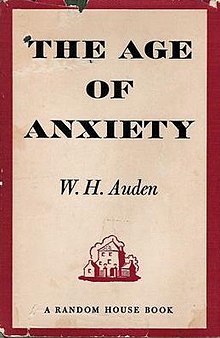
(publ. Random House)
The Age of Anxiety: A Baroque Eclogue (1947; first UK edition, 1948) is a long poem in six parts by W. H. Auden, written mostly in a modern version of Anglo-Saxon alliterative verse.
The poem deals, in eclogue form, with man's quest to find substance and identity in a shifting and increasingly industrialized world. Set in a wartime bar in New York City, Auden uses four characters – Quant, Malin, Rosetta, and Emble – to explore and develop his themes.
The poem won the Pulitzer Prize for Poetry in 1948.[1]
A critical edition of the poem, edited by Alan Jacobs, was published by Princeton University Press in 2011.
- ^ "The Age of Anxiety, by W. H. Auden (Random)". The Pulitzer Prizes. Columbia University. Retrieved 28 May 2017.